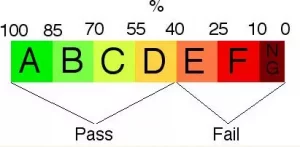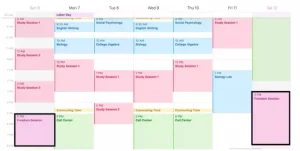In high school, college or university, the grade you get is a true reflection of your performance. Professors have different ways of grading students.
They rely on the ordinary grading system of percentage where 90% can be an A, 80-89% can be a B grade, 70-79% can be a C etc. Others may prefer the use of curves depending on how majority of students are faring in exams.
This also depends on the exam policy of the learning institution. There are those who grade students based on course assignments as opposed to exams.
Nonetheless, no matter the style used for grading, achieving higher grades is very important if you want to graduate and proceed to the next level of education and qualify for a good job.
Is D a Passing Grade?
Technically, when you score a D, you have not failed and this is considered as a pass. Most learning institutions consider failure of exams to be anything below 60% and grade D is above that. However, a serious student should not be happy with this because it is barely passing.
A D is simply a mercy pass from your professor. It is a grade considered as below average but still tolerable is some instances and this is a clear indication that you are not safe with it.
For instance, there are majors that have harsh requirement chains where a grade D student is unlikely to make it to the next level course.
Such majors include biology, music theory, calculus and science subjects. The only consolation for the grade D student is to change majors in order to take the next course.

Retaking the course is a reasonable solution to the D grade, especially if it affects your major.
The primary reason for going to college is to secure a good career in the field you have majored.
The subject or course you choose gives you the skill you need for a lifelong career. For instance, if you you have majored in engineering but end up scoring a D in physics, retaking the class is the best option. Potential employers will want to hire graduates who have passed the specific subjects that affect their career.
Instances when D becomes a passing grade
Most schools classify D as the lowest passing grade and it is enough to get you credit for your course. However, different schools have their own policies regarding D grades. For general education requirements, a D is a pass.
Instances when a D becomes a Failing Grade
A grade D scored in a prerequisite class is considered as a fail and the affected students will have to retake the class. If you get a D in a course in your major, the grade is a fail.
Tips on how to Avoid Getting a D
1. Have a Study Schedule

Your college itinerary is full of different activities.
You have to strike a balance between family responsibilities, school extracurricular activities and service commitments.
If you have a study schedule, it is easy to manage your time and tackle topics in small chunks.
Handling a little work for each class is easier as opposed to doing all assignments at once.
2. Do Away with Distractions
If you want to study effectively, you need to be focused. Thus, all distractions in your study environment should be eliminated. A productive study time means you should filter television, radio and phone usage.
Even more importantly, stay away from social media until you are through with your studies. Avoid any excuses for late homework save for genuine and necessary cases.
Turn your phone to flight mode or switch it off to avoid getting alerts and notifications. Luckily, the emergence of anti-procrastination extensions for your browser can help you to keep off distractions from social media. Maximum concentration will have a positive impact on your productivity and boost your chances of getting better grades than a D.
3. Study in Company

Studying in a group of like-minded students is helpful.
You can choose to be in a group or seek the company of a tutor to help you in areas where you are weak.
In a group, difficult concepts can be handled and students who are weak will benefit from those who have a better understanding of the subject.
In areas where you do not have time for the group, a private tutor is the best option.
4. Class Participation
When a student is actively involved in class proceedings, paying attention is easier. Passive listeners find it hard to recall all the important points taught in class. Fortunately, most lecturers now understand the significance of students participating actively in class hence they endeavor to give students all the support needed.
5.Homework
To avoid getting a D, make sure any homework given is done. Going to class with unfinished assignments or doing them just before a test is not a good sign of a student who want to get better grades. Through homework, a student can improve on weaker areas and expand his or her knowledge.
6. Know your Lecturer
Professors usually have different methods of running their classes. Therefore, it is important to learn what your professor expects of you as early as the beginning of a semester. Know their syllabus expectations and all the requirements of a course.
More essentially, know your professors at a personal level and make them your friend. Know how to communicate with your professor. This enhances communication making it friendlier to seek help when you are struggling in a particular subject.
.

Joseph is a freelance journalist and a part-time writer with a particular interest in the gig economy. He writes about schooling, college life, and changing trends in education. When not writing, Joseph is hiking or playing chess.
